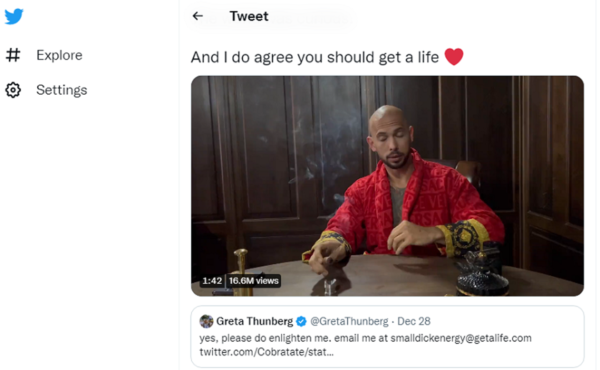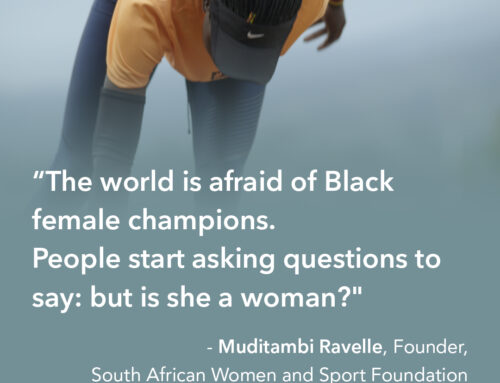
The internet exploded over the past week, following a major clap-back that quickly became one of the top 10 most liked tweets of all time. What emerged out of the spectacle was not only a take-down of a notorious online creep, but also an important conversation: is it ever okay to make fun of genital size?
Greta Thunberg’s take-down
If you aren’t up-to-date on the latest Twitter feud, environmental activist Greta Thunberg was targeted for harassment by known professional misogynist Andrew Tate. Tate had only recently been allowed back on Twitter when he tweeted at the activist, “Please provide your email address so I can send a complete list of my car collection and their respective enormous emissions.”
Many noticed this as a display of male obsession with size—both cars and genitals. Thunberg responded “yes, please do enlighten me. email me at smalldickenergy@getalife.com.”
Millions of people liked and retweeted her reply, which shut down his harassment while mocking his perceived obsession with “manhood”.
Tate was clearly impacted, responding with a video to try to restore his manhood featuring a cigar and his legs propped up in front of a pizza box.
Shortly afterward, he was arrested by Romanian authorities who had apparently been on the lookout for Tate. Many speculate that his location was identified by the pizza box, though the authorities have knocked this as a rumor. Ultimately, it was a victory for those targeted by the harassment of the alt-right troll.
However, a conversation soon popped up among the onlookers. While Twitter appeared to clearly take Thunberg’s side, some also wondered if those types of jokes can be harmful to people outside of Tate.
Who do “small dick” jokes hurt?
We know men often identify their penis size as a sign of manhood and masculinity, as it seems Tate did based on his extreme reaction to the tweet. It’s not just men tying these together—women often contribute to the narrative through jokes at the cost of people with smaller penises.
But “small dick” jokes impact people across many identities: cisgender men are not alone. Everyone’s genitals vary in size and appearance. Small phalluses may also be seen among transgender people taking testosterone, whose gender is not determined by their genitals or genital size.
When people talk about naturally small penises such as a “micropenis”, they are usually talking about intersex people. A micropenis can be considered an intersex variation. This is because genitals exist on a spectrum. Any larger-than-expected clitoris or smaller-than-expected penis might fall into the intersex category. This makes “small dick” jokes an example of interphobia.
They can be harmful to intersex people, who already receive judgment by a society with a poor understanding of who intersex people are and what genitals can commonly look like. As the recent response from Intersex Human Rights Australia, Fundacja Interakcja, OII Europe, and Intersex Society of North America pointed out in their recent response: interphobia can have serious real-world repercussions including the subjection of infants to “conforming” surgeries.
The size of genitals doesn’t, at the end of the day, correlate to maleness or masculinity in any way (something Tate has maybe yet to figure out.) People with small phalluses deserve to be free from social expectations and harassment about their genitals. They can and do have happy and fulfilling sex lives. They don’t deserve to have their bodies mocked or interrogated.
When we talk online, for whatever length of time discourse exists on the sinking ship that is Twitter, let’s consider who might get hit by body-shaming comments. Even if the target needs a harsh comeback, the other people watching who might be impacted don’t.
Our takeaways
Are we here to criticize Thunberg for retaliation against harassment? Not at all. But we hope for the people watching it all unfold, this is an opportunity to think about what language we use and why. There may be far more people impacted by stumbling on a joke about genital size than just the joke’s target.
And for Andrew Tate, we sure hope he enjoyed his pizza before being hauled away.






